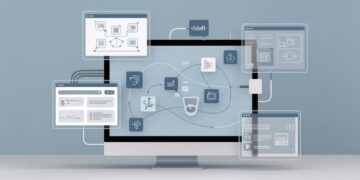Key Takeaways
- AI makes it easier for businesses to grow without increasing costs and complexity.
- Automation and intelligent analytics help companies save time and focus on what matters most.
- AI improves customer experiences and personalizes every interaction.
- Innovative tools help businesses predict trends, manage risks, and reach global markets faster.
- Thanks to affordable AI solutions, small and medium-sized businesses can now compete with bigger companies.
- AI brings new challenges, but staying up to date and training your team leads to long-term growth.
Introduction
Artificial Intelligence (AI) is changing the way modern businesses work. From startups to global corporations, companies everywhere are using AI to improve their operations, growth, and customer service. AI is not just about robots or science fiction. It is now a practical tool that helps businesses stay ahead of the competition and prepare for the future.
Today, using AI is no longer a choice for forward-thinking businesses—it is necessary. Companies can focus on innovation and customer satisfaction by automating routine tasks, making better predictions, and customizing services. This article explores how AI is a decisive advantage for scaling businesses, making daily work more straightforward and growth faster than ever before.
How AI Drives Scalable Growth
The main goal for any business is to grow—whether that means adding more customers, entering new markets, or increasing revenue. But growth often brings more work, more complexity, and more costs. This is where AI offers a real advantage. AI-powered business scaling solutions help companies expand their reach while using resources more efficiently.
For example, AI can automate everyday business tasks, from answering emails to processing orders, freeing employees’ time to focus on creative work or custom innovation. Smart AI tools can also help businesses recognize patterns in data, identify what customers want, and predict future demands. With these insights, companies can make smarter decisions, like which products to promote or which customers will likely buy again.
Another key benefit is that AI solutions can update and learn from new data, so businesses don’t have to constantly rebuild their systems. As a result, companies can grow their operations without hiring large teams or buying expensive equipment. This means more flexibility, lower costs, and less stress as the business expands.
AI In Everyday Business Operations
AI is not just used for big-picture planning—it improves everyday work, too. Many businesses already rely on AI for tasks like scheduling meetings, managing inventory, and tracking payments. Automated chatbots offer support to customers 24/7, answering questions or helping people place orders even when no one is in the office.
In human resources, AI tools can handle repetitive tasks such as screening job applications, scheduling interviews, and processing payroll. In finance, AI helps stop fraud by quickly checking for unusual activities and pointing them out automatically. In sales and marketing, AI platforms sort through vast amounts of data to determine which offers work best and which customers are most likely to respond.
What’s exciting is that AI systems learn over time. If a chatbot is asked a new question, it remembers the answer for next time. If there’s a quicker route for delivery, smart logistics software suggests it immediately. Businesses can adapt faster to changes and provide reliable customer service daily.
Better Decisions With AI Analytics
Good decisions depend on good information. However, as businesses grow, they collect more data from websites, social media, customer feedback, and sales numbers. Sorting through all this information is tough for people, but easy for companies. Using AI-powered analytics, they can turn raw data into valuable insights in seconds.
AI analytics can show which products are popular, which areas need more attention, and what customers will want in the future. For example, an online store can use AI to check which shoes or clothes have the best reviews, or which products see the most significant jump in sales during holidays. Retailers can then plan for busy seasons, change prices, or order more of the products people love.
In manufacturing and logistics, AI can analyze supply chains and predict delays or shortages before they happen. Instead of reacting to problems, businesses can prevent them and keep customers happy. The result is faster decision-making, less guesswork, and better use of company resources.
Personalizing Customer Experiences
Today’s customers want experiences built just for them. AI makes this simple. With the help of advanced systems, businesses can personalize product recommendations, emails, or even entire websites. When a shopper visits an online store, AI looks at what they’ve viewed or bought and suggests new products they might love.
In customer service, AI chatbots remember conversations and help people pick up where they left off, so no one needs to repeat the same question twice. When a business knows a customer’s preferences, location, and shopping habits, it can offer special deals or reminders, making customers feel valued and remembered.
Personalization leads to higher customer satisfaction and more sales. According to recent studies, personalized recommendations increase conversion rates by up to 30%. That means when businesses use AI to personalize experiences, both customers and companies benefit.
AI For Sales And Marketing Growth
AI makes marketing more innovative and more effective. Marketing teams use AI to test ads, find the best images and headlines, and predict which words will catch attention. With AI, businesses can automatically adjust campaigns based on real-time results, ensuring budgets are spent on what works.
In sales, AI helps identify leads most likely to buy, rank them by priority, and even suggest when salespeople should reach out. AI can also predict when existing customers might be ready to purchase again. Analyzing data, AI recommends the best time to send offers, schedule calls, or follow up.
This focus and timing save resources and maximize returns. Smaller teams can compete with bigger companies, and marketing budgets are used much more efficiently. Even in crowded and competitive markets, businesses that embrace AI marketing strategies experience significant growth.
Streamlining Operations With Automation
Routine tasks take up a considerable portion of business time and energy. But with AI, businesses automate tasks like data entry, document processing, appointment scheduling, and even shipping notifications. By saving daily hours, staff can focus on creative projects, customer service, and strategic planning instead.
Automated systems also reduce human error. Mistakes in data or schedules can cost companies time and money. AI checks everything repeatedly and flags any concerns. For example, AI can spot an unusual payment in finance and alert staff before a big problem develops. In logistics, AI tracks the movement of goods and updates everyone involved if delays happen.
As businesses grow, the benefits of automation grow, too. Tasks don’t pile up, deadlines are easier to meet, and teams feel less pressure. AI-driven automation creates a smoother path for scaling, which is vital for modern companies.
AI And Global Market Expansion
Going global used to be a big challenge, especially for smaller businesses. Today, AI breaks down many barriers. With instant language translation, companies can serve customers from different countries. Innovative art logistics platforms optimize shipping routes to handle international orders easily.
AI can also track local demand, compare pricing, and adapt marketing messages for different cultures and languages. Businesses can confidently launch campaigns in new markets, knowing that AI tools will help handle the details. Thanks to these intelligent systems, reaching a worldwide audience is realistic, even for newcomers.
By opening up new possibilities, AI doesn’t just support growth at home—it lets businesses compete and succeed anywhere in the world.
Risk Management And Security With AI
Every growing business faces risks, from fraud and cybercrime to changing market conditions. AI helps spot problems before they turn into crises. Financial institutions use AI to scan transactions for fraud, while online shops use it to identify suspicious activities or fake reviews.
Cybersecurity teams rely on AI to find and fix security issues as soon as they appear. These systems learn quickly, adapting to new threats without needing human programming every time. That means companies can handle more customers, data, and digital services without worrying too much about safety.
With the help of AI, even small companies can use the same advanced risk management tools as the largest corporations. This creates a safer environment for both the business and its customers.
Leveling The Playing Field For Small And Medium Businesses
In the past, only big companies could afford the latest technology. Many AI tools are now available as easy-to-use cloud services, with minimal setup and cost. Almost anyone can automate workflows, analyze customer data, and compete with larger businesses. Smaller teams can access innovative tools that help with marketing, inventory tracking, payroll, and more. As a result, they can adapt quickly, serve customers better, and respond to industry trends without hiring extra employees or adding overhead expenses. Some AI platforms are designed explicitly for medium-sized businesses, including tutorial support and support services, mastering, and ming art, and they are easier to use.
Adopting AI is a smart move for many businesses, but it does come with challenges. First, companies must choose the right solutions for their needs—not all AI tools are created equal, and the wrong choice can waste resources. It’s important to start small and grow as you learn. Staff training is key. Employees need to understand new systems, feel comfortable asking questions, and be able to spot when something is not working as expected. Open communication and ongoing education help teams adapt to AI’s rapid pace of change.
Protecting customer data is essential, too. Trust is the foundation of every business, and clear data policies help keep information safe. Many AI services have advanced security features by default, but companies should always review their strategies and keep up with the latest best practices.
Finally, there’s the human side to consider. AI is a powerful tool, but genuine relationships, creativity, and judgment still matter most. Businesses succeed by combining innovative technology with a genuine personal touch.
Preparing For The Future With AI
The pace of change in AI will only keep increasing. Businesses that adopt AI now will be ready for new opportunities as the technology advances. By integrating AI tools, companies make their operations leaner and more reliable, freeing up time and resources for growth and innovation.
Ongoing learning is the best way to stay current. Leaders should watch industry trends, attend digital workshops, and encourage their teams to share AI-related news and updates. Technology partners and advisors can help smooth the transition and keep businesses one step ahead; AI will be one of the most significant business breakthroughs, since there is much to gain from substantial improvements to breakthrough discoveries.
The AI advantage is clear: scalable solutions allow businesses of every size to grow, adapt, and thrive in today’s world. By adopting AI, companies automate routine work, make better decisions, and offer personalized experiences that customers love. AI opens endless possibilities, whether streamlining operations, breaking into global markets, or predicting new trends.
While there are challenges to overcome, the benefits of AI far outweigh the obstacles. Organizations can confidently scale to new heights with careful planning, training, and commitment. The future belongs to those who can combine the power of AI with human strengths, and the time to start is now.
















